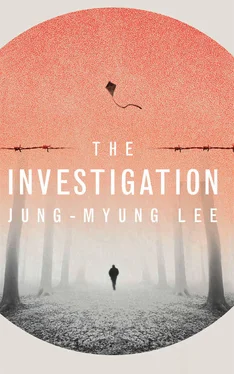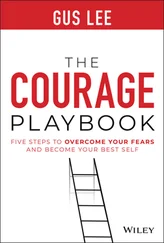‘Sir, I wasn’t able to get to it because there has been too much to do.’
Maeda glared at him. ‘You mean you were lazy. Get me all of his documents right away! I’m going to handle this myself. You just give him a good beating!’
Sugiyama gave his superior a stiff salute and turned around.
Sugiyama whacked his club across the prisoner’s bare torso tied to the torture rack. It sounded as though something was breaking within Dong-ju. His thin shoulders were bare, his joints bulged. Under the light his pale skin was almost translucent. Sugiyama had been foolish, lazy. Despite knowing what would ultimately happen, he’d been lulled by the arsehole’s mellifluous words. He hadn’t dealt with the danger lurking within. He’d been practically criminal. He should have burned the confiscated documents at the very beginning. He should have turned Dong-ju into a cripple then.
‘You fucked me over,’ he panted, his voice cracking. ‘Talk! What does this goddamn poem mean?’ He tossed a pen and piece of paper on the desk. ‘Translate it into Japanese!’
Dong-ju picked up the pen with his swollen fingers. The pen trembled as it pushed across the crumpled paper. Words poured out like river water, words that signified innocent confession, pure anguish and embarrassed guilt. Finally the pen fell on the paper, heavy as a rock. Reading it, Sugiyama felt rejuvenated, as though he’d become a boy again. He threw a glance at the waiting guards. They melted into the darkness, knowing from experience that this was when Sugiyama began the most brutal phase of his interrogation.
Sugiyama picked up the paper with the original Korean poem written on it. It had been constructed from several different pages, cut into long strips and pasted roughly together with glue. ‘Where did you get this goddamn paper?’
With great effort Dong-ju moved his bloodied lips. ‘I cut tiny slivers off the bottom of the postcards and pasted them together with rice.’
‘The rice is for you to fucking eat, not for you to make paper for your scribbles!’
Dong-ju flashed him a faint smile.
Sugiyama’s club trembled in the air. ‘What were you planning to do with this dangerous poem?’
‘That’s not a dangerous poem.’
‘Is that so? When Koreans read this poem, it’s obvious they’ll think about home and get disgruntled. Were you planning to start a riot?’
‘There’s no proof that this poem makes anyone feel that way.’
‘No proof? It’s obvious this poem will make anyone’s emotions run wild!’ Sugiyama hesitated. He couldn’t reveal that it had made his own cold, violent heart falter. He threw down his club and lowered his voice. ‘When I read your stupid poem just now, I felt dizzy.’ Sugiyama paused for a breath. ‘This will be the death of you. I’m not going to kill you. But I’m going to wash the inside of your head. You’re going to solitary. Fifteen days!’
Two days later, Maeda called for Sugiyama to meet him at the incinerator. The head guard was looking more relaxed. ‘We got him quickly, so we were able to stop this document from spreading. You made the right decision, Sugiyama. Two weeks in solitary will either make him a corpse or wipe his mind clean.’
Sugiyama stood to attention. ‘He’s a writer. Words are branded on his mind. He’ll survive just so he can write again.’
‘No matter,’ Maeda said, smiling, a gold-capped tooth glinting in his mouth. ‘A danger that’s discovered is no longer a problem.’
He tossed Sugiyama a bundle of papers. Red letters were stamped on the top. To Be Incinerated. Sugiyama flipped through them. ‘Boy’, ‘Snowing Map’, ‘Night Seen from Here’, ‘Morning of the Beginning’, ‘Another Home’, ‘Night Counting Stars’. The words trembled.
‘Strictly speaking, this incident wasn’t your fault,’ Maeda reassured him. ‘Really, it’s his fault. He’s being punished accordingly. You just need to clean up. Go ahead and burn these.’
Sugiyama felt his heart drop. ‘I’ll finish reviewing them as soon as possible and incinerate them after sorting.’
‘Do it now!’ Maeda snapped. ‘Just throw the whole bundle in. He violated the Maintenance of Public Order Act. Resistance runs in his veins. Just look at this poem here!’ Maeda impatiently snatched the manuscript out of Sugiyama’s hands and flipped through it until he found the page he was looking for. He shoved it in Sugiyama’s face:
ANOTHER HOME
The night I return home
My skeleton follows and lies down next to me.
My dark room leads to the universe
And the wind blows on me from somewhere, from the sky.
Looking at the skeleton that gently weathers in the dark
Is it I who is crying
Or the skeleton
Or a beautiful soul?
The dignified dog
Barks at the darkness all night.
The dog barking at the darkness
Must be chasing me.
Go, go
Go like a fugitive.
Go to another beautiful home
Behind the skeleton’s back.
— September 1941
‘See?’ Maeda spat triumphantly. ‘Everything from the first line to the last is seditious. This poem contains explicit anti-Japanese themes. What else would it mean for a dignified dog to be barking at the darkness? The dog is the stubborn Korean prisoner, the darkness means the occupation. Another home is a liberated Korea. It’s urging the Koreans to fight for the liberation of Korea!’
Sugiyama stared at the poem. ‘You’re being too generous, sir. He wrote this in September 1941. He visited his home in Manchuria during his studies in Seoul. He was just anxious about the future. These are just a kid’s worries. The skeleton and beautiful-soul image are just a fancy way to admonish himself. It’s not deep enough to be grandiose nationalism. Sir, it’s just emotional drivel.’
Sugiyama’s heart quaked. The young man from the poor Japanese colony desperately longed for home, but he wasn’t able to hide even there. He was describing an era when he had nowhere to turn to, an era when longing was banned.
Maeda turned the pages to another poem. ‘Well, this one’s very obviously anti-Japanese!’
SAD TRIBE
White towel wrapped around black hair
White rubber shoes on rough feet.
White blouse and skirt shield sad body
White belt ties around thin waist.
‘White towel, white rubber shoes, white everything!’ Maeda trumpeted. ‘You know that the colour white is beloved by Koreans! Black hair, rough feet, sad body, thin waist — these are complaints! The white garments are a coded suggestion for the Koreans to fight us off.’
Sugiyama swallowed. ‘As you said, that poem definitely contains an inflammatory nationalism. He’s Korean, so this is of course inflammatory. But not all the poems are like that.’ He flipped quickly through the manuscript and began to read another poem out loud:
BOY
Sad autumn drops like fall foliage all around me. Spring is being readied at each spot left vacant by a leaf and the sky is spread above the branches. The boy looks into the sky and blue paint dyes his eyebrows. He wipes his warm cheeks with two hands and blue paint dyes his palms. He looks at his palms again. A clean river flows along the lines, a clean river; in the river is a face, sad like love — beautiful Suni’s face. The boy closes his eyes in bliss. Still the clean river flows and the face, sad like love — is beautiful Suni’s face.
His own low voice lingered in his ears. Sugiyama looked down at his palms, at his hands as cold as the river. With those hands he’d beaten people without discrimination. He was suddenly ashamed.
Читать дальше












